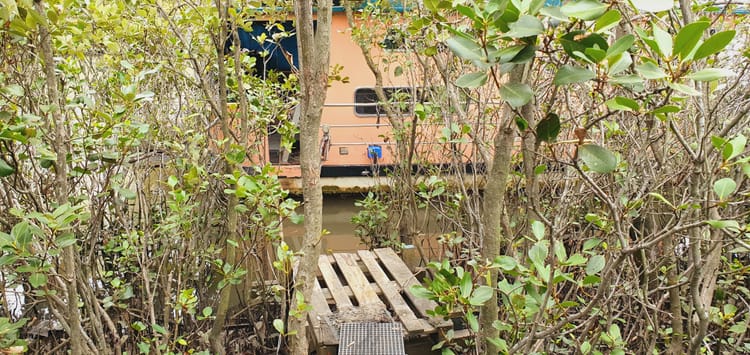Associating with Lidia
Note: I first published this article in October 2022. Four months later, Lidia Thorpe quit the Greens to sit as an independent senator, ostensibly due to disagreements on positions the federal party room had taken.
But I think this episode needs to be understood in the broader context of the Greens repeatedly failing to adequately support people of colour/First Nations people who stick their necks out by publicly representing the party, and in so doing, become larger targets for character assassination by the party’s political opponents (as another example, look at how the party still refuses to assign any additional staff to Deputy Leader Mehreen Faruqi despite contiual racist attacks and the fact that she is subjected to far greater public scrutiny than most white politicians).
Original article:
Since she became a federal Senator (and particularly since she was appointed Deputy Senate Leader for the Greens), Lidia Thorpe has been the target of an aggressive smear campaign to delegitimise her and weaken her ability to influence public discourse and political decision-making.
I wouldn’t necessarily describe it as a ‘coordinated’ or ‘concerted’ campaign, because although some of those responsible are probably strategizing informally together, I don’t think it is actively coordinated – this is just how the political establishment organically responds to perceived threats… Various actors in the system (including journalists and commentators) instinctively know what roles to play without anyone even having to direct them.
Watching from a distance, it all feels pretty familiar to me; in my 6+ years as a city councillor I’ve experienced a toned-down version of similar (but not identical) patterns of treatment.
When someone who refuses to fit themselves into the mould of how a politician is supposed to act (and look and talk) gains a big platform within the electoral politics sphere, this alone is already destabilising to established power structures. That’s because the continued rule of millions of people by a few hundred elite power-holders is premised on the myth that ‘ordinary’ people can’t be trusted to participate meaningfully in democratic decisions about our collective future, and that ‘better-qualified’ politicians must be elected to make the decisions for them.
It’s not really so different to the modus operandi of monarchs – politicians are expected to act like they’re not quite human, to help maintain the charade that there’s a good reason for them to have so much power. If too many politicians stop acting the way politicians usually act, this starts to remind the masses that there’s nothing special about premiers and ministers, and actually, almost everyone is capable of participating in big decisions about how we’re all governed. This is a subversive idea that implicitly challenges the very notion of hierarchical representative democracy.
In Lidia’s case, not only is she refusing to comply with certain silly norms of decorum – she’s Aboriginal. And the entire nation of Australia – including the federal Parliament – was founded on the fraudulent basis that Aboriginal people were ‘subhuman,’ and less than equal to the wealthy white men who comprised the first colonial parliaments. So her very existence and presence in the parliamentary chamber is implicitly threatening to the status quo, especially when she refuses certain silly rituals like swearing allegiance to a colonial monarch. Chelsea Watego’s commentary on ‘unmitigated blackness’ makes this point much more eloquently than me.
The irony is that Lidia is in many respects much more ‘qualified’ to be an elected political representative than many politicians, who have relatively little experience leading or representing people (at least, people who aren’t employees contractually bound to follow their orders). Not only is she much more directly connected to and immersed within oppressed communities who are most in need of better parliamentary representation, but she is also more experienced at political advocacy, having previously served as a State Parliamentarian and in various leadership roles of Aboriginal community organisations and political advocacy bodies (but not, notably, as a parliamentary staffer).
But on top of refusing to play by the rules of the game, Lidia is also speaking hard truths, proving extremely effective at challenging establishment narratives and amplifying critiques that delegitimise the colonial kleptocracy’s grip on power.
So it’s hardly surprising so many people are coming for her.
The pattern is not new…
Opponents – including politicians from other parties but also people in the business sector who feel their interests are under threat – will feed clickbait-hungry journalists a ‘scandal’ that’s not really very scandalous. The media and political classes love making mountains out of molehills and brewing storms in teacups.
Once a few stories like this have been published, sub-editors start using adjectives such as ‘controversial’ and ‘radical’ to describe the person whenever they report literally anything they do or say.
If media outlets call someone ‘controversial’ or ‘divisive’ or ‘troublemaker’ often enough, this reputation tends to stick after a while, regardless of whether there’s any basis to it.
I remember once pulling up a journalist who described me as ‘controversial’ and directly asking them, “What exactly have I done that makes me so ‘controversial’ and ‘divisive’?” and after stumbling for a few minutes, all they could really point to was that I sometimes co-organised protests (which lots of politicians do) and that I’ve said the Queensland Police have a problem with systemic racism (which is a conclusion that all sorts of bodies including Australia’s Federal Court have also come to – hardly an extreme view).
There’s a self-reinforcing, circular logic to how the media (and social media commentary) can shape a public figure’s reputation over time.
As the ‘controversial’ reputation gets entrenched, any mistake or minor slipup becomes sensational. Journalists will report on stuff that they wouldn’t cover or consider newsworthy if another politician did it.
After a while, the reputation becomes so divorced from the reality of the person that it begins to shape how others interact with them.
If you believe and expect someone to be ‘divisive’ or ‘confrontational’ or ‘difficult’ because of how the media portrays them, you’re going to interpret their behaviour through that lens. So words and actions that might be completely innocuous or have some other perfectly reasonable explanation are looked at in the worst possible light.
And if you believe they’re a troublemaker, you expect them to cause trouble.
A couple years ago, in an ABC radio interview where I said I would support protests regarding a local issue, the host asked me (in a good-natured and off-handed manner) “Councillor you’re not going to get arrested again are you?” But at the time, I’d never been arrested in my life.
I pointed that out and he quickly apologised. But I thought it was telling that thanks to several years of sensationalist reporting about my ‘controversial’ involvement in various protests, even this experienced and highly engaged journalist was under the mistaken impression that I had a history of getting arrested.
Smear campaigns distort our perceptions of reality.
For Lidia Thorpe, it’s now at the point where even relatively minor indiscretions – like once getting angry at someone in a meeting – are blown out of all proportion.
The most recently reported indiscretion is that she failed to declare that she was dating an Aboriginal bloke who was a member of a motorcycle club. By all accounts she wasn’t in a serious or long-term relationship with him – they were just dating. Putting aside the fact that the guy didn’t even have a criminal history, and the over-the-top moral panic about ‘bikie gangs,’ failing to declare a not-very-serious short-term fling is hardly a case of major wrongdoing, particularly in the context of all the far dodgier things other non-Indigenous politicians have done which don't lead to their demotion.
For those who are tying themselves into knots about how Lidia dating a bikie while also serving on a law enforcement committee is supposedly an unforgiveable conflict of interest, let’s remember for a second how many politicians vote on housing policies while also owning investment properties. How is that not a goddamn conflict of interest?
But we shouldn’t even be having a debate about whether Lidia’s actions were ‘very bad’ or ‘a little bit bad’ or ‘perfectly understandable under the circumstances,’ without first acknowledging the broader political context.
Lidia’s willingness to speak up uncompromisingly against racism and colonisation has made her a lot of enemies, and she is being targeted because of her identity as a Black woman who doesn’t back down or sell out.
This is why I’m so disappointed in the response from the Australian Greens.
The party leadership should never have let things get to this point. They should have recognised months ago that she was the subject of a relentless ongoing smear campaign and challenged it head on by publicly pointing out the racist, elitist motivations behind it every time journalists regurgitated the ‘scandals’ that Lidia’s political opponents were feeding them.
I assume the Greens leaders thought asking Lidia to resign was the best way to short-circuit the attacks and deprive the story of oxygen, but that’s a really poor strategic call. In the eyes of the mainstream media and the political commentariat, asking her to resign legitimises the attacks and gives them more momentum.
But here’s what a lot of people in the Greens perhaps still don’t understand: They are never going to stop attacking her.
She is too powerful and too effective at elevating marginalised perspectives. She's also too effective at winning more support for the Greens – especially from Aboriginal voters. This is a major concern particularly for the Labor Party, who have been able to take Aboriginal voters for granted for decades.
With some notable exceptions, the Greens have generally struggled to reach voters outside middleclass, tertiary-educated demographics. Even if the policies and broad vision are theoretically in the interests of a much wider constituency, the identity of the messenger and the way the message is delivered matter deeply.
The Greens need people like Lidia (much more than she needs them) at the forefront of the movement if the party is to expand beyond its existing support base.
The political establishment knows this too, and will work especially hard to destroy Greens politicians who are effective at connecting beyond the usual green lefty bubbles.
So the Greens have to come to terms with the fact that if they elevate radical candidates from oppressed backgrounds into positions of leadership, of course there will be more scandals and attacks targeting them, particularly as the party keeps growing.
I wouldn’t be surprised if there’s another overblown ‘scandal’ about Lidia every month from now until whenever she retires from Parliament.
She’s human like the rest of us. As with anyone in a tough role, there will always be little slip-ups to point to.
When other politicians make those kinds of mistakes, they are ignored or forgiven as understandable human error. But when she makes them, they’ll be nationwide news and people will demand that she step down from parliament altogether.
Instead of buckling under the first sign of pressure, the Greens need to have Lidia’s back, and point out that if the political establishment is working this hard to get rid of her, she must be doing something right.
Her community understands this. The #AssociatingWithLidia hashtag that’s been trending in First Nations social media circles for the past couple days tells you everything you need to know about how highly she is regarded on the ground, and also about how the Greens should be responding to these smears.
Once all the bed-wetters have had time over the weekend to calm down and think through all this, the party needs to come out strongly in support of Lidia and the work she’s doing, and stop letting Sky News and the major parties call the shots.
Thanks for reading! If you'd like to see more of this kind of commentary and analysis, please consider signing up for a $1/week paid subscription to support my work...





Member discussion